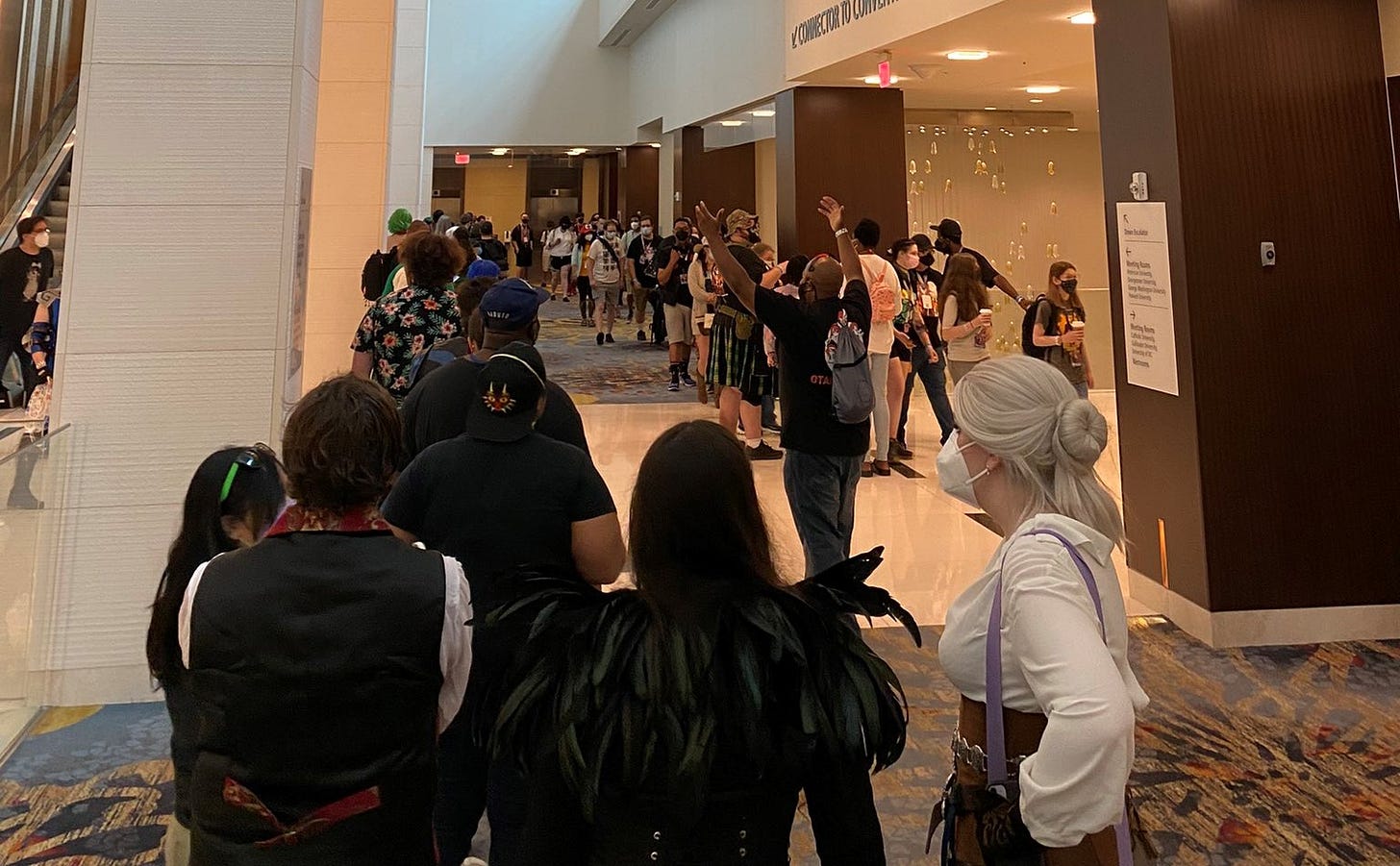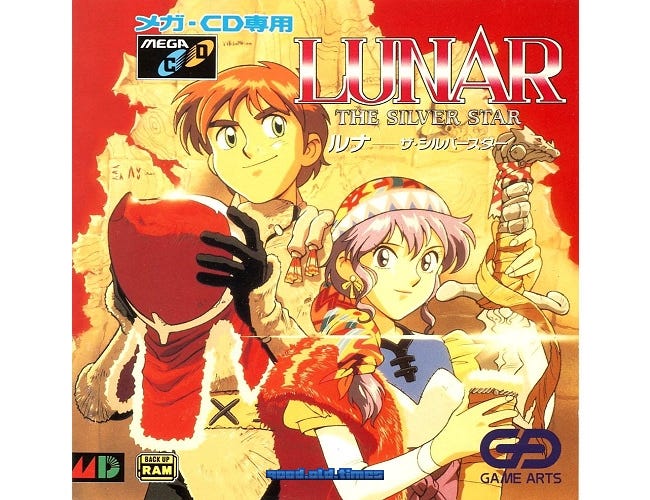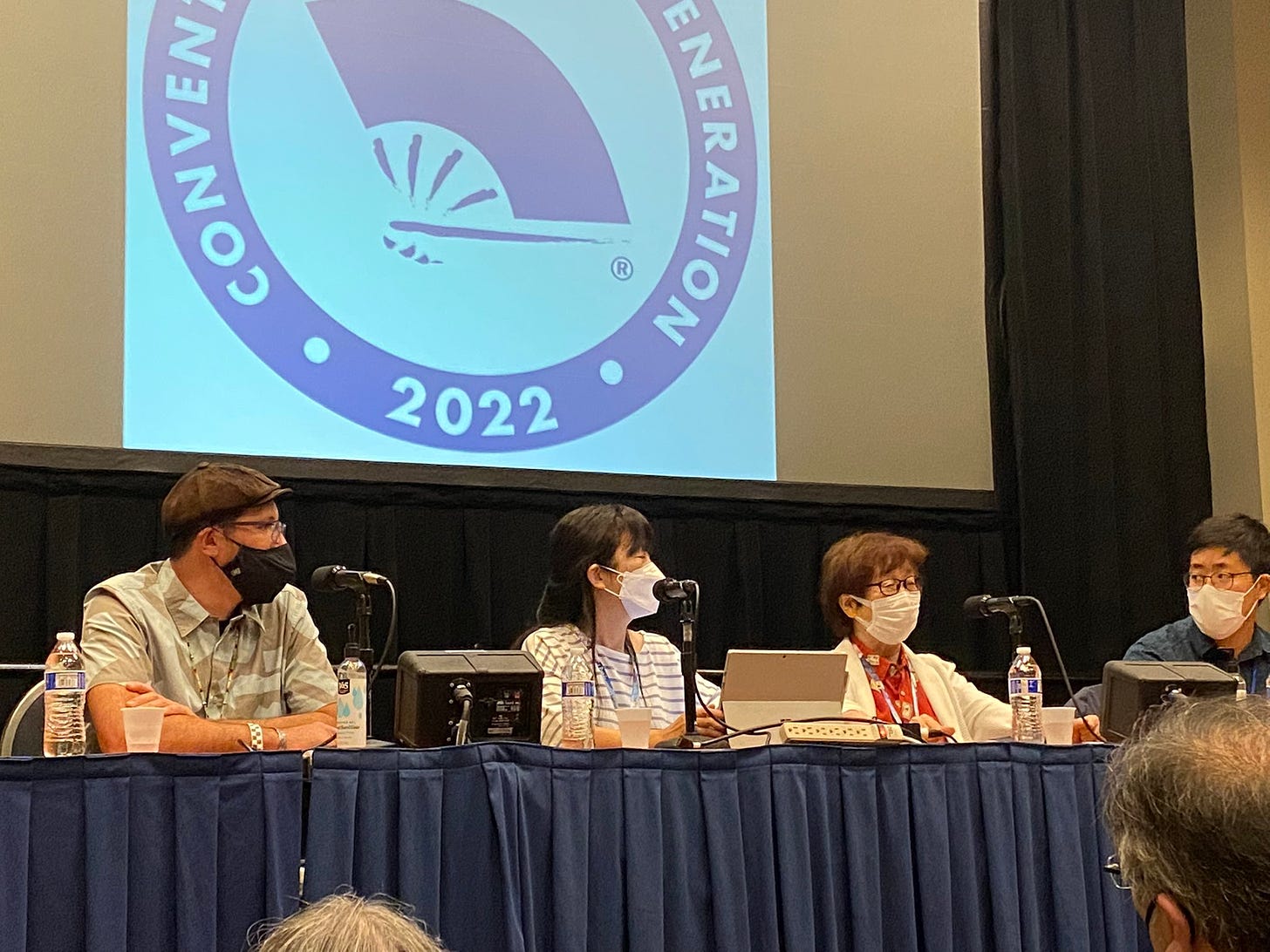
I almost typed “Otakon 2002” into the title box.
That was twenty years ago. That was my first anime convention.
I had a crew I used to hang with at cons and otaku events all through the 00s. I still see them, but they don’t go to cons anymore. One old friend said to me, “Otakon! You’ve gotta have a crazy story for us!”
(This good-looking friend and I once cornered a stalker taking photos of him, diving behind columns for her shots. She told us it was for a Yahoo group where people traded candid shots of cute boys at anime cons.)
I thought about it, and I realized I didn’t. Nothing as wild as the old days, anyway. Times have changed, both for me personally and for the American anime convetion.
In the 2000s, anime was fringe internet nerd culture, and conventions were Wild West spaces where people lived out their fringe identities in person.
(There was a time when your first indication you were nearing an anime con or otaku event was the presence of screaming teenage Hetalia cosplayers chasing each other around with the reviled “yaoi paddles”. You wanna talk about “zoomers”…)
Today most of pop is “nerd culture”, the internet is where we all live, and anime is normal. The otaku have chilled out. Gen Z’s con kids seem just fine, or at the very least, I haven’t seen a single one of them attack anyone with a wooden oar.
So things have changed for me and things have changed for the convention. But that gradual cultural transition pales by comparison to the changes the COVID pandemic brought about.
Let’s talk about the pandemic
Last year’s Otakon— 2020 was understandably skipped— was a relatively muted affair despite a large attendance. Everybody thought that nobody else would show up, so everybody showed up and said “oh no”. I remember frequently retreating to the hotel room, not taking my chances for very long in the dealer’s room, artist’s alley, or even the game rooms.
To its credit, this year Otakon had a much clearer COVID policy. Vaccination was required and enforced with wrist-banding. Weeks later, I don’t know of anyone who came back from the 40,000-person convention positive.
It can’t be overstated how important a coherent and enforced COVID policy was for the overall mood of the event. People felt safe, and you could see it in the way they walked and talked; Hell, I felt more safe at Otakon than I do on the New York City subway. Attendees were also excellent about wearing masks, all through a weekend of miserable heat.
There was also some anime stuff, probably. I’m going to talk about particular moments at the convention as I recall them.
Population density

I should probably mention out of the gate that this was a record-breaking Otakon, with a reported 40,000 people attending. By contrast, a “big” year for Otakon is usually more like 26,000. According to staff, they’re getting close to filling up their convention center.
The big increase in population was definitely felt this year; in fact there were times when I specifically ducked out of the convention because it wasn’t worth being on the floor anymore. On peak hours— Saturday afternoon— it became near-impossible for con-goers to get into the building.
There’s definitely a pressure-valve effect here after COVID guidelines have been lifted; people really wanted to be at this convention. I also suspect that Otakon having two K-pop concerts lined up brought in a big crossover audience that might not have come out otherwise. Anime is normal now, and K-pop is legitimately mainstream hot.
This is all speculation on my part, but I’d definitely point to this— and, also, the massive exodus from the convention during the hours that the concert was going on— as a possible reason behind the big numbers.
During the post-con Q&A session an enthusiastic fan said that he’d like to see Otakon hit 100,000 people, at which the staff shuddered and protested.
That’s something I really like about Otakon, a personality trait that has persisted over the years. Unlike for-profit cons like AnimeNYC— which is currently scalping its own tickets at $170— Otakon has always positioned itself as a fan event rather than a corporate one.
When these events get too big, they get worse. The material gets more common-denominator and less interesting. The population goes from feeling like a gathering of friends to a swarm of enemies. The convention becomes a trial that you put up with in order to enjoy some guest or event that you wanted to see.
For my summer vacation money, I’d rather have Otakon. I hope I’ll always be able to chill at this con.
Who the hot cosplays were
It’s worth noting how long it’s been here since people were comfortable at an anime con and how much the culture has changed since then. For example, the popularity explosion of Vtubers in the English-speaking world happened almost entirely during the pandemic. There were a few Vtubers running around the convention, but not as many as I’d expected. It goes to show that what looks huge in your own personal circles may not be so gigantic in the wider nerd world.
We all covered a lot of new ground while locked up— the theme of this con was, appropriately, time-skips in anime/manga— and more than anywhere else, the costumes reflected this.
The top cosplay was pretty easily SpyXFamily, the Shonen Jump sitcom that is basically engineered to be a massive, international all-audiences hit. (It’s good.) 60s style icon Yor Forger led the list; cosplayers can either go in on her assassin dress or still look cool in her around-the-house outfit. I saw quite a few group cosplays of the whole family as well.
In what I predict will be more of a flash-in-the-pan trend, Marin from My Dress-Up Darling was a very popular choice, often as a pair cosplay with boyfriend Gojo in tow. It’s an irresistible meta choice, as Darling is about cosplay. The braver cosplayers actually wore Marin’s daring, edgy cosplay looks, rather than her school outfit.
Seeing cosplay of the in-universe Saint Slippery’s Academy For Girls: The Young Ladies Of The Humiliation Club: Debauched Miracle Life II was impressive enough, but I was worried someone was gonna call the cops on the girl who dressed up as the succubus.
Passing by in opposite directions on an escalator, Pat and I yelled at an Alex and Luna pair (Lunar: The Silver Star) that they were great and we loved them.
Voice lessons with the greats
I never miss Toshio Furukawa (Piccolo in Dragon Ball, Ace in One Piece, many others) and Shino Kakinuma (Naru in Sailor Moon), a delightful veteran Japanese voice actor couple.
They’re repeat visitors who seem to really enjoy Otakon and DC, and they put on legitimately great presentations.
In the Japanese VA world, the younger actors are still actively hustling and “in the game” so to speak, so you get pretty standardized professional answers from them. Furukawa and Kakinuma, on the other hand, are veterans— Furukawa an honest-to-god living legend— and they have a lot more room to talk about themselves and their craft.
Speaking of craft, we kind of took voice lessons from the seiyuu couple. They walked us through many different types of laughs, each of which we performed as a group (a couple of hundred people in this room) back at the panelists.
Even in something as basic as a laugh we learned just how much thought and fine detail goes into the performance of each character. Ace doesn’t laugh “hahaha,” he laughs “pu-hahaha.” That popping breath, Furukawa says, is meant to sound refreshing to the listener.1
My favorite laugh was the “three-stage” laugh, which you can think of as a villain’s crescendo. You know the scene where the bad guy thinks they’ve won and laugh louder and louder, right? We did that, and it broke our throats. We carried our final “A-HAHAHAHA!” for about ten seconds, as the actors told us that frequently one would need to carry that laugh all the way into the commercial break.
I was worried I was sick in the days after the con. Turned out it was just the throat wear from talking with people for hours and three-stage laughing so much.
Kai Shiden from Mobile Suit Gundam does more of a “nu-hahaha”, because he’s kind of a dork





